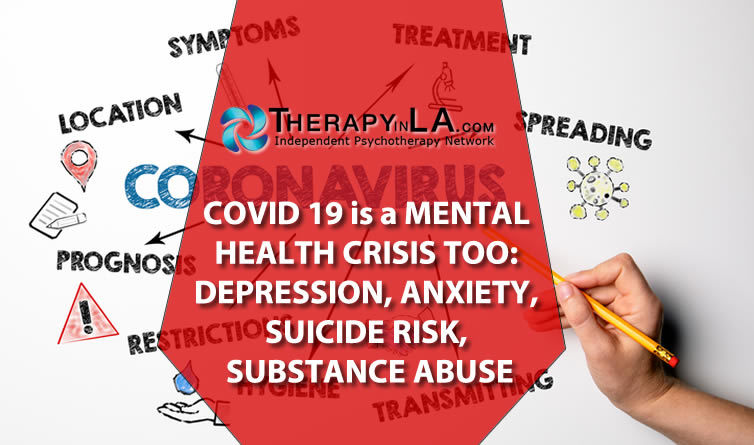COVID 19 is a MENTAL HEALTH CRISIS TOO: DEPRESSION, ANXIETY, SUICIDE RISK, SUBSTANCE ABUSE
COVID 19 is a MENTAL HEALTH CRISIS TOO: DEPRESSION, ANXIETY, SUICIDE RISK, SUBSTANCE ABUSE
Two-plus months into sheltering at home due to the COVID 19 crisis, and beginning to re-open our economy, we are in the midst of another kind of health crisis. This one has to do with psychological health and well-being. Compared to the medical crisis, it’s more of a phantom emergency that is hardly getting the attention it deserves. Our mental health services are woefully inadequate (https:/www.washingtonpost.com/health/2020/05/04/mental-health-coronavirus/).
As Susan Borja (head of the traumatic stress research program at the National Institute of Mental Health) notes: “I worry about the people the system just won’t absorb or reach. I worry about the suffering that’s going to go untreated on such a large scale.”
Consider the following data points:
- A Kaiser Family Foundation poll reveals that almost 50% of Americans view the COVID 19 crisis as hurting their mental health.
- A hotline for emergency calls nationwide saw a 1,000% increase in calls in April.
- The same hotline had more than 20,000 texts come in during April.
- One online therapy service, Talkspace, had a 65% increase in clients since February, with anxiety related to the COVID crisis dominating the concerns.
Oren Frank, the CEO of Talkspace, notes that the increasing demand for services tracked the geographic progression of the disease across the country. “What’s shocking to me is how little leaders are talking about this. There are no White House briefings about it. There is no plan.”
Past experiences with natural disasters, terrorist attacks and economic slumps have shown an increase in suicides, overdose deaths, and substance abuse – all clearly shown by reliable data. But when Congress passed record amounts of relief for the current crisis, only a miniscule part of that funding went to mental health services.
Private practice therapists have scrambled to provide online services. Professional organizations have lobbied hard to get insurance reimbursement for such services. Community mental health centers are experiencing a loss of revenue and struggling to stay open to provide services to the most at-risk people.
The president of Mental Health America, an advocacy group, Paul Gionfriddo, looks long-term: “If we don’t do something about it now, people are going to be suffering from these mental health impacts for years to come. That could further harm the economy as stress and anxiety debilitate some workers, and further strain the medical system as people go to emergency rooms with panic attacks, overdoses, and depression.” One study of the recession of 2007-08 showed that for every percentage point increase in the unemployment rate, there was about a 1.6 percentage increase in suicides.
If unemployment increases 5 percentage points to match the Great Recession, that will likely translate into 4,000 more suicides and 4,800 more drug overdoses. If our unemployment rates match the Great Depression of the 1930’s, we would see 18,000 more suicides, and overdose deaths increase by 22,000. That’s a huge loss of life.
Christine Moutier, chief medical officer of the American Foundation for Suicide Prevention, notes that “…suicide is preventable”. Interventions make a significant difference: limiting access to guns and lethal drugs, screening patients for suicidal thoughts, providing therapy for underlying psychological issues, and ensuring access to therapy and crisis lines.
The National Suicide Prevention Lifeline is available at 800 273-TALK (8255). Crisis Text Line is available 24/7 by texting 741741.
The members of the Independent Psychotherapy Network are accessible – by phone, email, and telehealth (phone calls and/or video therapy). We attempt to make therapy affordable, whether that be by accepting insurance reimbursement, discussing fees to make them affordable, or making referrals to trustworthy sources of help.
Alan M. Solomon, Ph.D. is a clinical psychologist in private practice in Torrance, CA. A member of the Independent Psychotherapy Network, he can be reached at 310 539-2772, or dralanms@gmail.com
Copyright 2020 by Alan M. Solomon, Ph.D.

